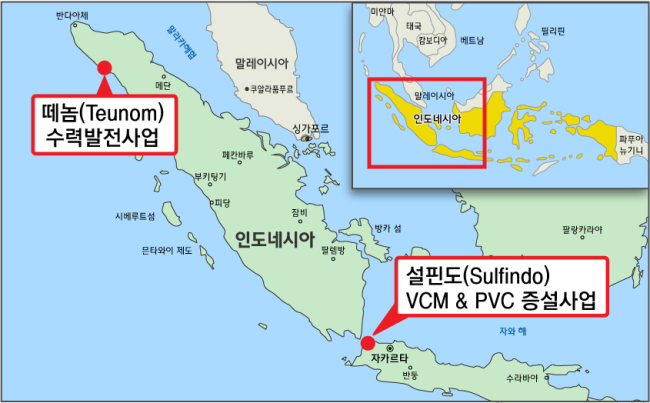Hyundai Engineering bolsters business in Indonesia
By Kim Bo-gyungPublished : Sept. 19, 2018 - 16:28
Hyundai Engineering signed memorandums of understanding with Indonesian officials on the expansion of its industrial facilities and the construction of a hydroelectric power plant there, an effort to increase its presence in the country’s growing market, the company said Wednesday.
The industrial facilities specialize in the production of vinyl chloride monomer and polyvinyl chloride.
“Based on our experience with the perfectly constructed Asahimas vinyl chloride monomer production plant in Indonesia in 2016, we will push the Sulfindo business forward. In doing so, we will contribute to strengthening trust and economic ties between the two countries,” the company said.
The MOU signings took place last week at the Korea-Indonesia business and investment forum held in eastern Seoul last week, attended by Indonesian President Joko Widodo.
The industrial facilities specialize in the production of vinyl chloride monomer and polyvinyl chloride.
“Based on our experience with the perfectly constructed Asahimas vinyl chloride monomer production plant in Indonesia in 2016, we will push the Sulfindo business forward. In doing so, we will contribute to strengthening trust and economic ties between the two countries,” the company said.
The MOU signings took place last week at the Korea-Indonesia business and investment forum held in eastern Seoul last week, attended by Indonesian President Joko Widodo.

Hyundai Engineering will expand vinyl chloride monomer and polyvinyl chloride plants in Merak, located within Indonesia’s Banten province, which are managed by Indonesian petrochemical company Pt. Sulfindo Adiusaha, the company said.
If the deal goes through, the volume of vinyl chloride monomer produced annually would increase to 370,000 tons from the current 120,000 tons, and polyvinyl chloride production would increase from 110,000 tons to 360,000 tons, the company said.
The hydroelectric power plant will be built in cooperation with the Indonesian energy company Terregra Asia Energy, located in the Teunom River area in Aceh province.
Meanwhile, Hyundai Engineering also signed a joint development agreement with Korea Midland Power and Posco Engineering & Construction to build a 92 megawatt hydroelectric power plant in Luwu Timur in Sulawesi province, it added.
Since Indonesian President Joko Widodo came to office in 2014, increasing electricity generation facilities has been a key project, and the country aims to build or expand plants in order to produce 35 gigawatts of electricity between now and 2026.
By Kim Bo-gyung (lisakim425@heraldcorp.com)








![[KH Explains] Hyundai's full hybrid edge to pay off amid slow transition to pure EVs](http://res.heraldm.com/phpwas/restmb_idxmake.php?idx=644&simg=/content/image/2024/04/18/20240418050645_0.jpg&u=20240419100350)






![[From the Scene] Monks, Buddhists hail return of remains of Buddhas](http://res.heraldm.com/phpwas/restmb_idxmake.php?idx=652&simg=/content/image/2024/04/19/20240419050617_0.jpg&u=20240419175937)

![[KH Explains] Hyundai's full hybrid edge to pay off amid slow transition to pure EVs](http://res.heraldm.com/phpwas/restmb_idxmake.php?idx=652&simg=/content/image/2024/04/18/20240418050645_0.jpg&u=20240419100350)

![[Today’s K-pop] Illit drops debut single remix](http://res.heraldm.com/phpwas/restmb_idxmake.php?idx=642&simg=/content/image/2024/04/19/20240419050612_0.jpg&u=)